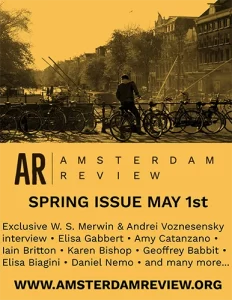Driftless Review – Spring 2013
Published by Platteville Poets, Writers and Editors, LLC—“an organization dedicated to showcasing the works of emerging and established writers whose creative journeys have in some way brought them through the Driftless Region”—Driftless Review is a brand new online journal, this being the inaugural issue which features poetry, prose, and visual art.
Published by Platteville Poets, Writers and Editors, LLC—“an organization dedicated to showcasing the works of emerging and established writers whose creative journeys have in some way brought them through the Driftless Region”—Driftless Review is a brand new online journal, this being the inaugural issue which features poetry, prose, and visual art.
In Lydia Conklin’s prose piece “What the Kid Does,” the Kid strives for attention when she clearly isn’t receiving it from her parents or her friends in the way she would like; she is caught between childhood and adolescence, yet it isn’t a coming-of-age story either. In Jacob Reecher’s “On the Rocks,” Kevin is also caught in that spot, but he seems to have more of an interest in doing “mature” things than the Kid does. On a trip to the beach with his mother, he sneaks alcohol, smokes cigarettes, and watches the teenagers play volleyball as a form of research on women, “because understanding a woman’s man was part of understanding the woman.” But all of this is contrasted with his other focus: finding an interesting new rock for his collection. The end is left open-ended. Perhaps he has learned his lesson about drinking and smoking, or perhaps he’ll do it again next weekend.
But this isn’t to say that all of Driftless Review is about this idea of adolescence. In fact, Jennifer Kerske’s “Grief Jar” deals with a very different, delicate part of life: dealing with death. While attending a funeral for her boyfriend’s grandpa, she points out ideas of grief that I’ve always understood, but have never put into words myself:
That’s how all of us can find common ground with the dead without facing our own mortality. We take all the memories we have of the person in the casket and put them in a jar. The memories become our grief allowance. Bonus points are granted for photos of ourselves with the deceased. The person with the fullest jar is the one who gets to feel the worst. Everything is a contest.
And in the midst of it, she remembers the death of her mother, who passed when the narrator was only 17 due to a car accident which was the mother’s own fault: “She had a drug problem and a sex problem and a bunch of other problems that made her less than a decent role model and even if she hadn’t . . . died I wouldn’t have been any better off.”
The poetry in this issue didn’t stand out to me as strong as the prose, but I did enjoy and spend time on Rita Mae Reese’s “How to Lose a Leg” and Samuel Amadon’s “The Pennsylvania Station Sequence.”
Though I do have two complaints, as a whole, this is a good first inaugural issue. The first is that prose is simply defined as “prose,” and does not delineate fiction versus nonfiction. While this may not be an issue for some, it makes a difference how I personally value a piece. My other qualm is that the “emerging writers” are in their own section and labeled as such. This puts out a stigma (which is different for every reader) about the piece or writer before ever delving into it. Though, it is nice to know that Driftless Review is making an attempt to highlight up-and-coming writers.
[driftlessreview.org]






